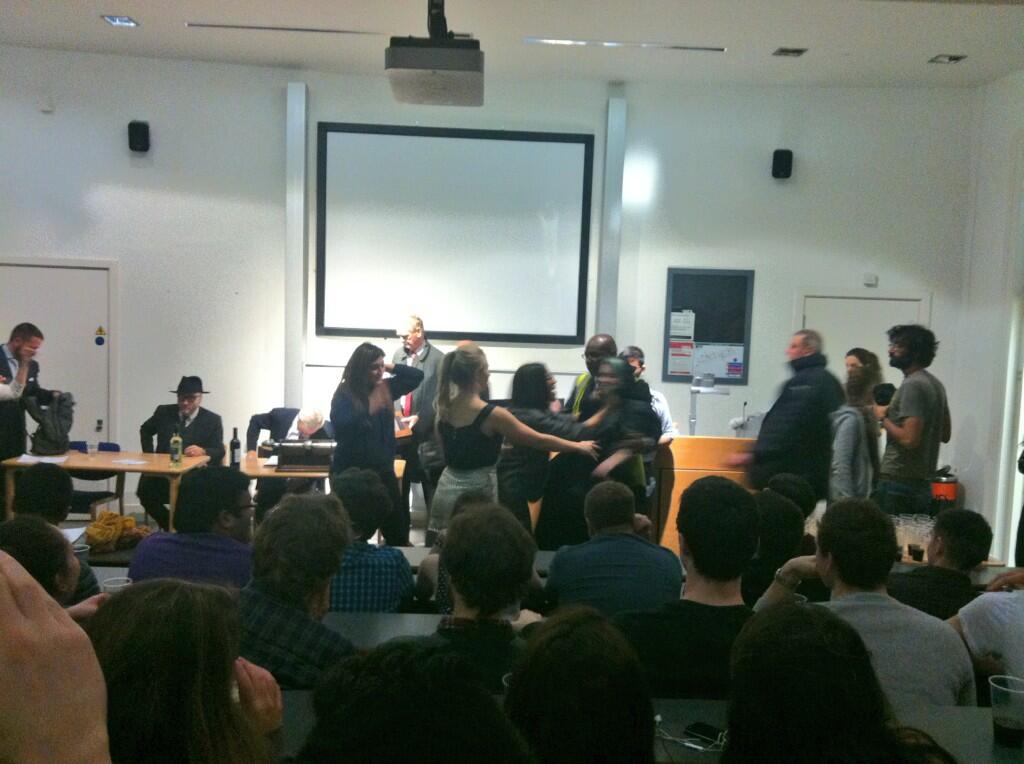Further adventures in Intersectionality
'White settlers' who 'cut off indigenous people's hair as part of genocide'; you make 'a lot of erasing statements', to 'silence' and 'exclude', in the name of 'white solidarity'.
'how fucking dare you … turn around and put the word racist in quotation marks like the accusation is a trivial or silly one. …your response has been at all times to try and define this racism out of existence…your response at all turns has been to argue, essentially, we've got a moral chip on our shoulders. YOU FUCKING CRACKER'
Who could they be talking about? Are these perhaps some racist white settlers exterminating indigenous people, and degrading blacks?
Well, no. In the first paragraph are tweets to the New Statesman columnist and feminist Laurie Penny, and the second paragraph are replies to the Guardian columnist and self-styled revolutionary socialist Richard Seymour.
Laurie Penny got into trouble before when this attempt at solidarity with Pussy Riot was misinterpreted as her putting on 'blackface'
Both Penny and Seymour have made a point of arguing for the latest fad in leftist thinking, 'Intersectionality'. 'Intersectionality' means taking seriously the many different oppressions, and how they intersect. My socialism 'will be intersectional or it will be bullshit,' has Seymour made a point of saying.
Richard Seymour has often tried to anathematise others, like the late Christopher Hitchens, whom denounced in a whole book as an 'apostate'
Given that they are so keen to speak out against oppression in all its multi-layered forms, it seems really bad luck that they should be accused of being racist crackers and white settlers. Why are they the ones denounced?
And who are the critics who judge them so harshly?
They are their friends. That is right. That is what their friends think of them.
In Richard Seymour's case, it is what his own comrades in the International Socialist Network - that he recently helped to set up - think of him: that he is 'a fucking cracker' . Laurie Penny says that the woman who tweeted or re-tweeted all of the posts above - about her being a settler engaged in genocide - is someone she takes very seriously: 'I care what you think'.
When they were called out for what they said they were both surprised, even offended. 'You would struggle to cite a single example of me doing that,' objected Seymour; Penny was being attacked for 'things I did not say'.
Protesting innocence, for some reason, only seemed to make their critics angrier, and more vociferous. Seymour was told that he was 'bending over backwards to defend white supremacy'. While Penny was a 'defensive white woman' (said the white woman Penny Schenk).
At that point, anyone sensible would have withdrawn, or told their accusers to get lost. Sadly for them, Penny and Seymour were already deeply invested in the ideology of 'intersectionality'. To have withdrawn at that point would - according to the etiquette of that outlook - have been evidence of a failure to learn from others.
'Is it because I am a Woman of Colour?' Laurie Penny's critic, Flavia Dzodan is a marketing expert from Holland
Because their critics spoke for 'People of Colour', the argument runs, then Seymour and Penny were obliged (regardless of whether the arguments made were any good) to sit down and be quiet, and be taught a lesson.
One critic put the argument like this to Seymour: 'When I'm in a discussion and every black person involved says what I'm saying is racist, I try to shut up and listen rather than tell them they don't know what they're talking about.'
So it was that both Seymour and Penny tried to adopt a penitent stance, and to promise that they were indeed listening to the criticisms, in the hope that that would assuage their accusers. 'that's something I'll have to work on,' said Seymour. 'I'm thinking about how to mitigate this in my future work,' said Laurie Penny.
When the Anglo-Saxon kings of the eleventh century agreed to pay the invading Danes money, it did not stop the invasion. They came back for more 'Danegeld'. When Laurie Penny and Richard Seymour tried to mollify their critics it did not stop the criticisms - they just got stronger.
But… wait a minute, you might ask. What was it that Seymour and Penny did to bring down this rain of criticism on their heads? Did they invade a country? Or did they lynch someone?
No. Seymour was talking about that chair - you know the one that looks like it is a black woman, that Roman Abramovich's girlfriend had herself photographed sitting on for the Evening Standard. Seymour did not say he liked the chair. He said it was racist. But he made the terrible error of pointing out that some sex play involved racial acting out (which is a bit outré, but not actually an endorsement of racial oppression).
Penny's crime was even greater: she wrote an article in the New Statesman about short hair being (a bit of) a feminist statement… except that she did not say anything about the hair of 'Women of Colour'. Yes, that's right Laurie Penny's article 'does not include any mentions (even as a side note) of WoC hair issues'.
Onlookers were amazed. Padraig Reidy asked whether it was really true that Laurie Penny was 'being harassed because of a piece about her hair cut'? Penny's editor parodied the critics 'why is this piece about what it is about and not ABOUT EVERYTHING?'
Many left-wingers looking on at the argument among the 'International Socialists' were laughing. They knew that the far left were given to splitting over arcane debates about property relations in the USSR, or the correct position to take on the Syrian conflict - but they had never seen a Trotskyist group split 'over a chair' before.
But neither Seymour nor Penny were in a position to make light of the criticisms. Laurie Penny said that 'she was trying to stay in the room with people's anger without freaking out', and that she was 'literally … having a panic attack'.
Richard Seymour finally had enough, and said his critics were engaged in 'moralistic browbeating', and it was wrong that some subjects should be ruled off-topic, or that people should be anathematised in the debate.
These were the wisest things said, and maybe if they had been said earlier on, the row would not have gotten out of hand. But actually they were said in a letter of resignation, co-signed by six of his supporters. And so it was that the terrible event came to pass: the International Socialist Network really did split over its position on BDSM sex.
Neither Seymour nor Penny understand that these dead-end arguments come about because of their own commitment to 'intersectionality'.
They think that 'intersectionality' just means anti-racism. But it does not. In fact it means the opposite. Intersectionality is not about opposing racism. It is about institutionalising racism. It is about negotiating the differences between people that arise because of their race and their sex. What it rules out is that it might be possible to rise above such differences.
It works the other way around. To get influence in this world, you have to emphasize your differences, and amplify them. Currency for the intersectionalists is ever greater offence at the things people say, even - especially - the people closest to them.
The arguments put up against Seymour and Penny were absurd. But they got traction because Seymour and Penny themselves have both used similar allegations. They joined forces to attack 'Brocialists' and supposed 'rape apologists' such as the Marxist professor Alex Callinicos, the comedian Russell Brand and the left-wing MP George Galloway.
Warwick Students protest against the Marxist academic Alex Callinicos, saying he is a 'rape apologist', 16 Jan 2014
Using 'moralistic browbeating' themselves, proclaiming themselves that they were 'intersectionalists', Seymour and Penny only succeeded in laying themselves open to similar criticisms.
Calling anti-war campaigner George Galloway a rape apologists, these protestors tried to break up a debate over the UN at the University College of London Union, 27 Jan 2014
It is the person who most loudly proclaims their own rectitude, and so extravagantly dismisses the faults of others, who is most likely to be exposed themselves for wrong doing. The temptation to hunt out hypocrisy - to magnify the slightest thing to find it - is just too great.And if the evidence is not there, so what? You can always just make it up.
Further reading:Intersectional, or Just Sectarian?,
Billy Delta of Redfriars and
Bash Street Trots by James Heartfield
The Oppression Ouroborus: Intersectionality will Eat Itself and
Recognising No-one: the Politics of Recognition by Jason Walsh
Live by Intersectionality, Die by Intersectionality by Ross Wolfe
Exiting the Vampire Castle by Mark Fisher




